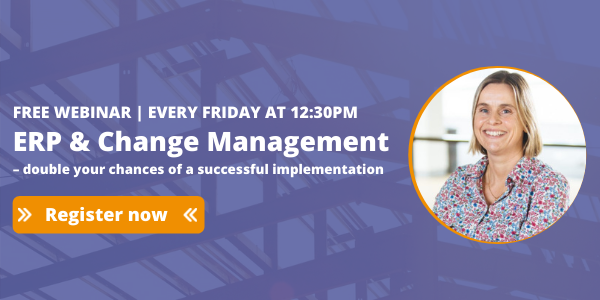Your new ERP System was going to deliver so much, seamlessly streamlining all the data for your organisation through careful ERP planning and implementation. However, it is not going smoothly and suddenly the dream tech solution is not looking like everything you were told it would be. Perhaps a more robust ERP communication plan could have helped manage expectations and address issues proactively.
There are many ERP horror stories about implementations going wrong, but instead of reading about those projects, ask yourself these questions instead:
- Are your key stakeholders invested and engaged?
The ERP implementation will affect different areas of the business and there will be many stakeholders. Make sure these are identified as early as possible and there is a clear plan to keep them engaged and excited about the system. An impact assessment to determine how your stakeholders will be affected by the change will help turn stakeholders into advocates. Don’t forget to consider how your suppliers and customers will be affected.
2. Is there capability, accountability and ownership within the business?
The ERP Implementation needs a Project Sponsor who will drive the project forwards and unblock the blockers. There needs to be clear roles and responsibilities within the project team with everyone clear on who is accountable for each output. But, also, within the wider business there needs to be accountability. Does the business have the right capabilities and structure to get this over the line and make the implementation successful? Are there any gaps? Have you considered a Change Team?
3. Are your business processes aligned to the ERP?
The issues and costs incurred through customising the solution to fit current processes can be mitigated by changing processes to utilise the best-in-class technology. Be sure to map current processes and make sure they can be re-engineered to work within the ERP. This would ideally have been done ahead of the ERP implementation and planning process, but if it has not been done correctly, this could be the problem. Effective ERP communication is also crucial to ensure all stakeholders understand the changes and align with the new processes.
4. Have you planned data migration accurately?
Often suppliers will leave the data migration to the client with minimal support. As data migration can be complex, make sure your suppliers understand they need to be part of the solution and be clear about articulating this from the outset. Your business readiness case should ensure your data is thoroughly cleansed and of excellent quality, ready to be pulled across. The best practice is to make users responsible for their own data and be wary of legacy data issues. The problem you are having could be with configuration rather than the system.
5. Are your teams ready to use the new system?
According to Deloitte, “the single biggest failure point for ERP implementations is the need for change management” and resistance to change is the biggest barrier to success with 82% of organisations citing it as the biggest factor. There will be many reasons why people aren’t ready and there will be ways to overcoming resistance and champion adoption. A Change Management team would be considering:
- Clear and consistent two-way communication
- Early visibility of the system as soon as possible
- Training programme
- Ongoing support
We have lots of free change management resources which might help find a way to unlock any resistance you are experiencing. You can also register for our free ERP webinar. If you still aren’t sure why your ERP Implementation isn’t going as planned then get in touch, we would be happy to give you a free consultation and try to get to the root of the problem. Contact EstherM@NineFeetTall.com
Sources: https://www.cio.com/article/2429865/enterprise-resource-planning-10-famous-erp-disasters-dustups-and-disappointments.html
https://www2.deloitte.com/content/dam/Deloitte/mx/Documents/human-capital/01_ERP_Top10_Challenges.pdf


